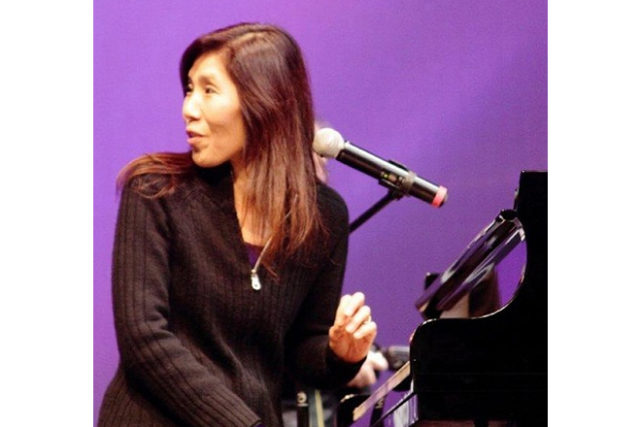by David Yamaguchi,
ON THURSDAY NIGHT, Nov. 16, I had a date with my cousin, Diane, to see Kuniko Fukushima sing and play the piano at the Royal Room, a jazz club in Columbia City near our homes.
When I opened the club door and we walked in, the first thing we heard at the reception front desk—without any beating around the bush—was “Nanimei-sama desu ka?” [How many are in your party?] I had to laugh, for the question took me by surprise. For until that moment, Diane and I had been walking on familiar Rainier Valley terrain, a few blocks from where we both attended elementary school. The experience is termed “cognitive dissonance,” which occurs when two non-agreeing truths co-exist.
In any case, across two sets, Ms. Fukushima put on a great show, alternating between her own songs and American standards, at times playing with kotoist Shiho Kurauchi and bassist Saburo Miyata. A contemplative lyricist who lists Carole King among her influences, Ms. Fukushima is a wondrous musician that we are lucky to have living among us. She moved here from Tokyo three years ago.
What Diane and I found the most thrilling was confirmation of how we are both on the verge of being able to understand Japanese song lyrics. We can put together phrases and even verses, but not quite entire songs. In this way, Diane and I are eccentric Sansei. Our interests reflect the influences of our late fathers, who ferried us to and from Japanese school like clockwork across 12 years of Saturday mornings from our family’s import-export store in the International District. In the store, our dads also modeled bilingual life for us.
Diane and I were the only Sansei in the club. The room was filled mostly with Japanese expatriates, readers of this paper and of its sister Japanese-language publication, Soy Source, where the concert was advertised.
THE NEXT EVENING, FRIDAY, I attended a reception at Japanese consul Yoichiro Yamada’s official residence, where the main guests were Tohoku University faculty and students and their UW counterparts. The two groups were concluding a two-day workshop on campus. The meetings were the public start of a new memorandum of understanding agreement between the two universities—a written agreement—to work together on four topics of strength and mutual interest: aeronautics; robotics; natural hazards, and miscellaneous topics. Termed the “UW-Tohoku University Academic Open Space Workshop,” the two groups will continue to meet semi-annually from now. The natural hazards connection especially makes sense to me, as the 2011 Tohoku earthquake and tsunami are likely to be the best available analogs for a similar future Northwest double-disaster. Accordingly, UW people need to be on the ground in Tohoku.
THE NEXT DAY, SATURDAY, was the Musical Bridge concert, hosted in Renton by the Japanese Community Service. Now in its sixth year, the featured singer was Kana Uemura, who hails from Osaka by way of New York City. As it had been several years since I last attended this concert, I found this event charming as well, as it is possible to sit very close to semi-famous Japanese singers—Ms. Uemura has sung on Japanese TV—in a way that would not normally be possible in Japan. I was in the sixth row from the stage.

FOR ME, THE THREE EVENTS reminded me of what is occasionally possible in Seattle for anyone interested in the US-Japan interface.
The three days also highlighted how much closer together the two countries are than when I first began paying attention to their relationship in the late 1980s. Most noticeable is the more widespread distribution of comfortable, functional English on the part of the Japanese performers and visitors. For example, English was the main language of conversation at the consular reception. I believe this greater facility largely reflects the influence of the internet—and its sites like YouTube—which make it possible for interested individuals in Japan (and Diane and myself) to immerse ourselves near-daily in second-language exposure and culture at limited cost.
Ask me what is current on Seattle TV and in pro sports and I haven’t a clue. On the other hand, I can go on and on about the latest Japanese pop singers, J-dramas, and old Japanese movies. Likewise, Diane had recently made for me a copy of her Yumi Matsutoya 40-year retrospective CD set.
Speaking of new developments in Japan, KING-5 broadcaster Lori Matsukawa—who easily qualifies as a fellow Japanophile—shared a few remarks on her recent trip to Tohoku during intermission at the Saturday concert. Her main point was that the ban for people living in radiation-contaminated Fukushima Prefecture has recently been lifted. Thus, evacuated families each face the question of what they should do now, after six years away, when the future of the damaged nuclear plant remains unresolved.
Coincidentally, Phys.org just came out with a relevant article on this topic. Their bottom line is that the life disruption caused by evacuation from low-level radiation exposure from damaged nuclear plants is seldom worth the few months of lifespan it saves. I refer readers to that article for further details.







